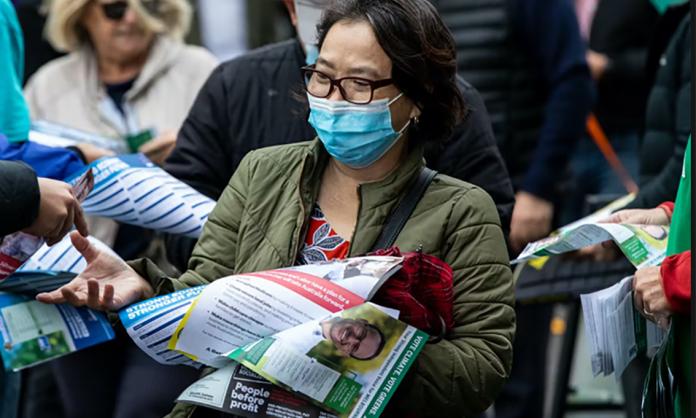COVID has impacted the lives of almost everyone in Australia, through illness, isolation and/or lockdowns. For two years it was at the centre of Australian politics, polarising opinion between supporters and critics of government health measures, exposing divisions between the state and federal governments and leading to a revival of right-wing street protests.
Yet COVID was barely mentioned by either the media or the politicians during the federal election campaign. Sophie Scott, national health reporter for the ABC, was one of the few journalists who drew attention to this in an article on 20 May titled “COVID-19 has been a dirty word this election”. As Scott pointed out, even though health experts have warned its impact won’t go away, neither party “released a detailed, standalone plan on how it will manage the pandemic in the future, including future vaccine supply, securing and distributing adequate antiviral medications and how to tackle emerging variants—which seem to be appearing every six months”.
Both major parties and most of the media have decided to bury any mention of the pandemic at the bottom of the news cycle, ignoring the rising death toll while moving on to other issues. This isn’t surprising considering that none of them have proposed an alternative strategy to the current one of doing almost nothing.
Despite the media and political blackout, COVID did impact the federal election.
The most obvious example is the thumping victory for the ALP in Western Australia. The Liberals suffered an 11 percent swing against them, losing half of their seats. While the Liberals suffered losses everywhere except Tasmania, WA was the only state where the swing against the Liberals was accompanied by significant gains for the ALP, not just independents and minor parties.
For two years, the Western Australian Labor government enforced a hard border to keep COVID out of the state. Premier Mark McGowan persevered with this approach despite repeated attacks by the Morrison government and a court battle with mining billionaire Clive Palmer. McGowan won massive popular support for retaining the hard border, and the Liberals’ attacks discredited them in the state.
Labor’s election campaign was overwhelmingly focused on the border issue with the slogan: “Only Labor will stand up for WA”. As the Guardian Australia political editor Katharine Murphy revealed in an article on 25 May, WA Labor formed a strategy group last July that created a campaign messaging guide centred on the COVID debates. It advised campaigners to attack the Liberals for siding with Clive Palmer’s legal case, and to repeatedly remind voters that Morrison championed COVID policies in New South Wales as the alternative to WA and compared people in the state to “cave people”.
Even Liberal Senator Michaelia Cash conceded to the West Australian that the key issues behind the ALP’s victory in WA were “the way we handled Covid, the closed border and the popularity of Premier McGowan”.
In the election battle over the seat of Kooyong in Melbourne, one under-reported issue driving voters away from Josh Frydenberg was his role as the most prominent Victorian Liberal attacking ALP Premier Daniel Andrews during the height of the lockdowns and health restrictions.
As one example, in October 2020 Frydenberg posted a video to Twitter in which he said there was “a callous indifference in Victoria from the government to the loss of jobs and to the plight of small business” due to the lockdown and that this “bloody-mindedness is unforgivable”.
Brent Hodgson, a marketing and data consultant for teal independent Monique Ryan’s successful campaign to unseat Frydenberg, told the Australian Financial Review that during the campaign he “found strong discontent towards Frydenberg for his relentless criticism of Victorian Premier Daniel Andrews and his politicising of COVID-19 policy” amongst the electorate.
On the other side of the equation, various far-right parties who campaigned against lockdowns and COVID vaccines did relatively well in the election. One of the places where they picked up votes was in the outer suburbs of Melbourne, where the far right played a key role in the so-called freedom rallies last year. While opposition to lockdowns and health measures wasn’t the only issue these parties ran on, it helped them mobilise a new crowd of campaigners and supporters and solidify hostility towards the major parties.
The pandemic may have been pushed into the background of mainstream political discourse, but it continues to shape aspects of Australian politics and will likely do so for some time to come.









